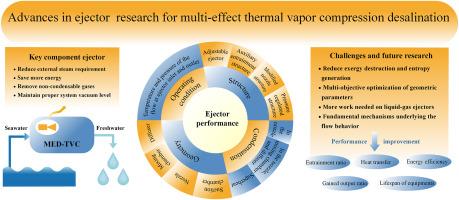Advances in ejector research for multi-effect thermal vapor compression desalination
IF 16.3
1区 工程技术
Q1 ENERGY & FUELS
引用次数: 0
Abstract
In the face of global freshwater shortage, energy-efficient desalination technologies are receiving increasing attention. Multi-effect distillation with thermal vapor compression systems is widely used due to its many advantages. In the system, there is one ejector used as a thermal vapor compressor to reuse the steam from the effects, which reduces the overall external steam requirement of the system and the total energy consumption; the other ejector is used to remove the non-condensable gases without additional energy and maintain the system at a proper vacuum level to mitigate corrosion and scaling issues. The performance of such systems strongly depends on the performance of these ejectors. In this work, research on the ejectors used in multi-effect distillation with thermal vapor compression systems is critically reviewed to assess the state of the technology. This review includes ejector working principles, effects of operating conditions, geometry parameters, different structures and condensation phenomenon on the performance of ejectors. Finally, areas of more research needed are identified.

多效热蒸汽压缩海水淡化喷射器研究进展
面对全球淡水短缺的问题,高能效海水淡化技术正受到越来越多的关注。多效蒸馏与热蒸汽压缩系统因其诸多优点而得到广泛应用。在该系统中,有一个喷射器用作热蒸汽压缩器,重新利用效果产生的蒸汽,从而降低了系统对外部蒸汽的总体需求,减少了总能耗;另一个喷射器用于去除不凝性气体,无需额外能源,并将系统保持在适当的真空度,以减轻腐蚀和结垢问题。此类系统的性能在很大程度上取决于这些喷射器的性能。在这项工作中,对热蒸汽压缩多效蒸馏系统中使用的喷射器的研究进行了严格审查,以评估该技术的现状。综述内容包括喷射器的工作原理、操作条件、几何参数、不同结构和冷凝现象对喷射器性能的影响。最后,确定了需要开展更多研究的领域。
本文章由计算机程序翻译,如有差异,请以英文原文为准。
求助全文
约1分钟内获得全文
求助全文
来源期刊

Renewable and Sustainable Energy Reviews
工程技术-能源与燃料
CiteScore
31.20
自引率
5.70%
发文量
1055
审稿时长
62 days
期刊介绍:
The mission of Renewable and Sustainable Energy Reviews is to disseminate the most compelling and pertinent critical insights in renewable and sustainable energy, fostering collaboration among the research community, private sector, and policy and decision makers. The journal aims to exchange challenges, solutions, innovative concepts, and technologies, contributing to sustainable development, the transition to a low-carbon future, and the attainment of emissions targets outlined by the United Nations Framework Convention on Climate Change.
Renewable and Sustainable Energy Reviews publishes a diverse range of content, including review papers, original research, case studies, and analyses of new technologies, all featuring a substantial review component such as critique, comparison, or analysis. Introducing a distinctive paper type, Expert Insights, the journal presents commissioned mini-reviews authored by field leaders, addressing topics of significant interest. Case studies undergo consideration only if they showcase the work's applicability to other regions or contribute valuable insights to the broader field of renewable and sustainable energy. Notably, a bibliographic or literature review lacking critical analysis is deemed unsuitable for publication.
 求助内容:
求助内容: 应助结果提醒方式:
应助结果提醒方式:


